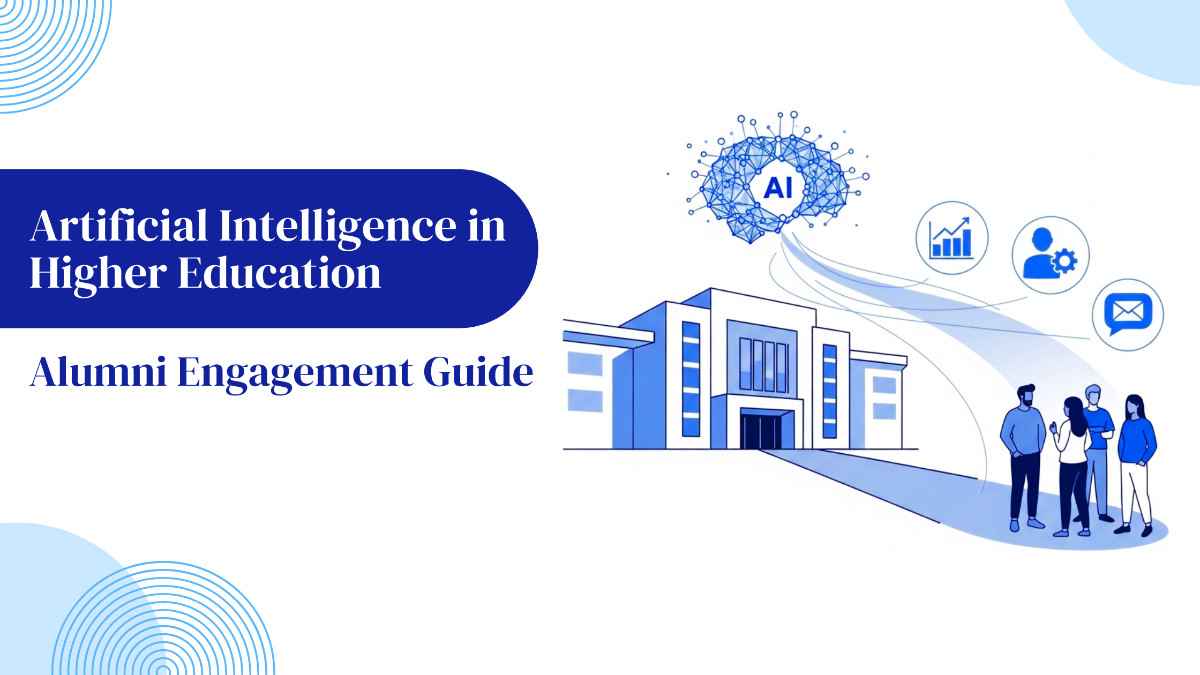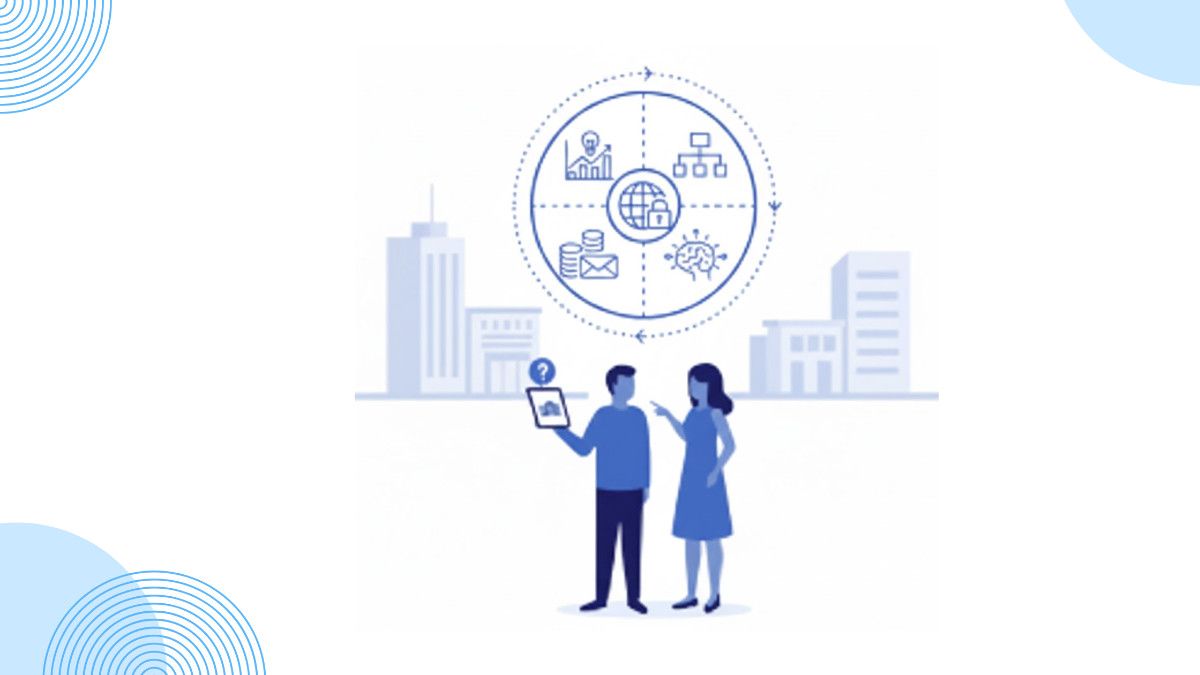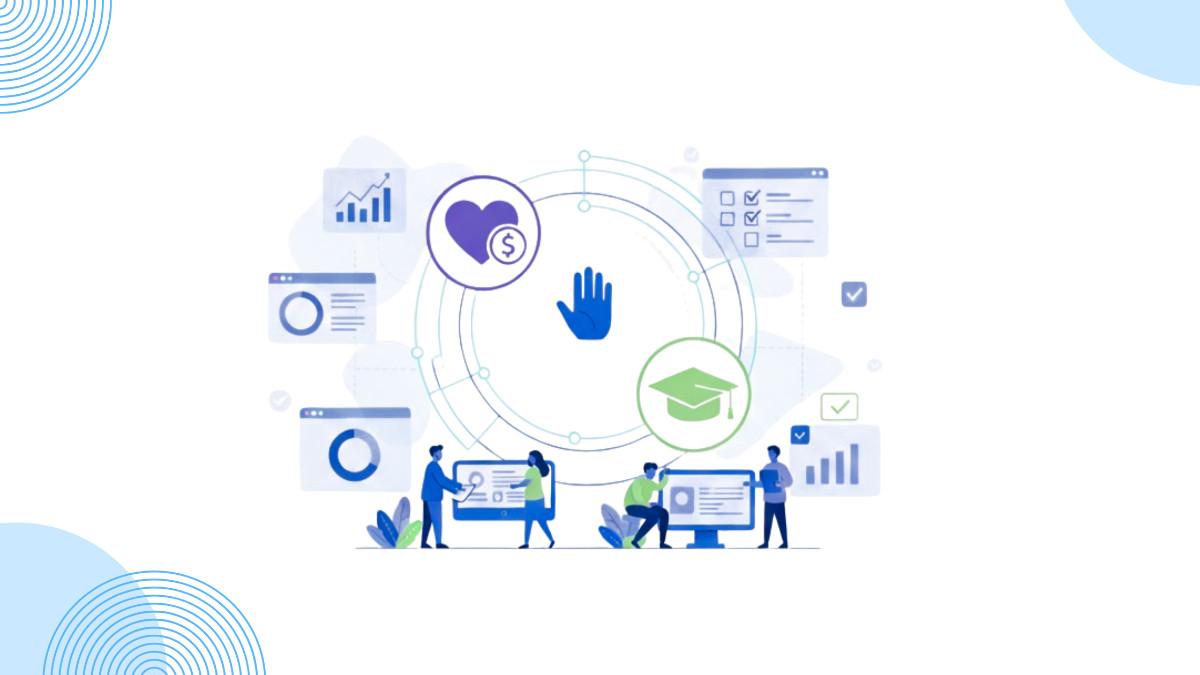Artificial Intelligence in Higher Education: Alumni Engagement Guide
Explore how artificial intelligence is transforming alumni engagement in higher education with smarter strategies .

AI is proving to be a game-changer in transforming alumni engagement into success. With intelligent algorithms and machine learning, institutions can process vast amounts of data to gain insights and deliver personalized experiences to their alumni.
Using AI, institutions can efficiently monitor alumni interactions, anticipate their needs, and provide timely, relevant support.
Additionally, AI-based recommendation systems can connect alumni to the right events, career training programs, and networking sessions to form meaningful and long-lasting relationships. Alumni interests and activity patterns can be determined by machine learning algorithms to offer tailored communication campaigns, improving event and program participation rates.
With the strength of AI, institutions can unleash alumni engagement to new levels, building more meaningful connections, and attaining triumph. The potential is endless, the payoff is certain—AI is transforming institutions’ ability to reach and connect with alumni bases.
The Role of Alumni Involvement
Alumni engagement is also a key driver of school achievement. Positive alumni relations can be beneficial in many ways:
Strategic Contributions
Boosting Reputation
Expanding Networks
Active alumni are more likely to be ambassadors for their alma mater, spreading the good news of their wonderful experience and affecting the choice of prospective students. By being directly associated with their alumni, institutions can create a lifetime sense of belongingness and loyalty.
Furthermore, alumni networks are a resource for current students and recent alumni. If alumni are active in their own schools, they can provide mentorship, career guidance, and career connections, having a potentially profound influence on recent graduates’ careers. Not only can these relationships help students in their early careers, but also help the institution as a whole by demonstrating the value of its programs and creating a culture of support and collaboration.
With the competitive landscape of today, organizations have no choice but to include alumni involvement in their planning. With the ever-changing dynamics of higher education, the support of the alumni becomes all the more essential. By investing in alumni involvement activities, organizations can create a lasting legacy that reinforces their brand, creates a strong support base for students, and eventually helps to develop the alumni and the organization as well.
Major Challenges in Alumni Engagement
While the value of such alumni contact is highly valued, no such connections are developed by most institutions. Some of the most common challenges are:
1. Wrong Contact Details
Graduates over time switch jobs, move to other locations, or get married and change their names, and institutions hence struggle to update their databases. Outreach efforts may hence fail, and disengagement and lost engagement opportunities may arise.
2. Generic Communication
Traditional methods of communication do not appeal to a diverse group of alumni. Alumni require and are interested in something different depending on their own personal experiences, professional lives, and stages of life. Institutions must recognize the diversity and make a change in their outreach strategy accordingly.
3. Limited Resources
The majority of institutions, especially smaller institutions, lack full-time staff or budgets for alumni relations programs. This lack of adequate investment can lead to lost relationships and overall declining alumni participation.
In order to overcome such hurdles, institutions must implement novel solutions that simplify their interaction processes and enhance their ability to contact alumni.
How AI is Revolutionizing Alumni Engagement
In the current era of digital transformation, artificial intelligence in higher education is opening up new possibilities. Institutions are actively exploring innovative ways to connect with their alumni communities…
Data-Driven Strategy
With the assistance of algorithms from AI, organizations can now sort through large volumes of data, identify trends and patterns, and utilize them to inform their outreach strategy. This allows them to be more specific in their effort, and outreach becomes effective and impactful.
Robotic Process Automation
AI can perform almost all work that has been traditionally done manually by staff—saving time. AI chatbots, for example, can respond to simple questions from alumni and give instant and accurate answers with a smile. It makes the overall alumni experience better and enhances operations efficiency.
Personalized Engagement
Artificial intelligence drives hyper-personalized communication that enables institutions to tailor messages to every single alumna or alum depending on their interests, preferences, and behaviors. Machine learning algorithms aid in developing adaptive communication plans that communicate with people on a personal level, triggering greater engagement.
Applying AI to Personalize Communication
AI makes personalized communication efficient and scalable. Why?
Segmentation: Segmentation can be performed by computer-based tools according to demographics, interests, or previous engagement.
Personalized Messaging: The messages can be customized for each group. For example:
- New graduates can be looking for job listings or advice.
- Mid-career graduates can be sent event invitations and industry trends.
- Board membership or legacies may be attractive to mature alumni.
Trigger-Based Outreach: Organizations can automate outreach based on life events or activity history—e.g., promotions or anniversaries—augmenting the emotional connection.
This level of customization not only increases response rates but also makes alumni feel valued and heard.
AI-Based Data Analysis to Support Alumni Insights
Thanks to AI-powered data analysis, institutions now know precisely how Alumni behave and interact.
Key Benefits:
- Identification of Trends: Identify what type of content, activities, or causes will best resonate.
- Predictive Modeling: Determine who the most probable person is to donate to a campaign or attend an event.
- Gap Analysis: Determine under-represented segments or alumni groups that need more frequent contact.
With such learnings, institutions can plan better, which is visionary, effective, and inclusive.
AI-Driven Virtual Events and Networking Platforms
Virtual events are now an essential aspect of alumni engagement—and AI smartens them up.
Before The Event:
AI recommends sessions or topics with reference to alumni interest and past attendance.
During the Event:
Alumni sharing the same career track or interest are matched up by algorithms.
Volunteers are directly advised to attend other sessions or individuals.
After the Event:
Auto-thank you messages, personalized surveys, and future opportunities based on their interests and feedback are sent to alumni.
AI platforms enable post-event groups or forums with ongoing energy and encouragement to further participate.
Implementing AI in Alumni Engagement Strategies
Appropriate adoption of AI begins with a strong foundation. Follow these steps to integrate it effectively.
Step 1: Evaluate
Audit your current databases and processes to identify inefficiencies in outreach and communication.
Step 2: Align
Coordinate marketing, alumni, and IT teams. Set shared KPIs for a smooth integration process.
Step 3: Select Tools
Choose tools like AI CRMs, chatbots, or analytics dashboards based on institutional goals.
Step 4: Monitor & Improve
Track key metrics and continuously optimize based on data insights and evolving needs.
Success Stories of AI-Powered Alumni Engagement
The majority of institutions have already embraced AI, and the result is impressive.
1. Targeted Campaigns Get More People Out
One of the leading universities used an AI-driven platform to survey the interests of alumni. This allowed:
- Extremely personalized communication
- Higher rates of event attendance
- More engaged and diverse alumni community
2. Intelligent Databases Increase Donations
A university employed AI to maintain alumni contact data current and monitor engagement on an ongoing basis. This resulted in:
- Improved data accuracy
- Expanded outreach
- A substantial increase in contributions and participation
3. Tailored Virtual Events Encourage More Engaging Interactions
A well-established institution enhanced its virtual events with AI. By examining participants’ data, it:
- Suggested relevant sessions in real-time
- Facilitated valuable alumni connections
- Enhanced overall event satisfaction and follow-up
Conclusion:
As artificial intelligence in higher education continues to evolve, embracing its potential for alumni engagement isn’t just a good idea—it’s a necessity…
With the assistance of artificial intelligence, institutions can:
- Offer individualized, on-time alumni experiences
- Automate business processes
- Gain more detailed insights to inform decisions
- Create lasting, committed alumni communities
The possibilities are limitless. The institutions that invest in AI today are positioning themselves for long-term success—through enhanced alumni networks, smarter strategies, and more scalable growth.
To explore how these solutions can align with your goals, institutions can get an estimate tailored to their needs and better plan their next steps with clarity.
Frequently Asked Questions (FAQs)
Yes, AI is reshaping higher education by enhancing personalized learning, automating administrative tasks, and enabling data-driven decision-making for both educators and institutions.
AI can be effectively used in higher education for adaptive learning platforms, grading automation, academic advising, virtual teaching assistants, and analyzing student performance trends.
AI research in higher education explores how artificial intelligence can improve teaching, learning, administration, and institutional strategy through predictive analytics, natural language processing, and intelligent systems.
AI is transforming education by creating personalized learning paths, supporting early intervention for at-risk students, enhancing curriculum design, and making education more accessible through intelligent automation.
Artificial Intelligence in Education (AIED) refers to the application of AI techniques to support and improve learning outcomes, teaching methods, and educational infrastructure at all levels.
Yes, AI has the potential to revolutionize education by promoting inclusivity, enabling real-time feedback, reducing workload on educators, and making lifelong learning more efficient and customized.
Let’s discuss the idea
Join hundreds of companies transforming their corporate communities with Almashines






